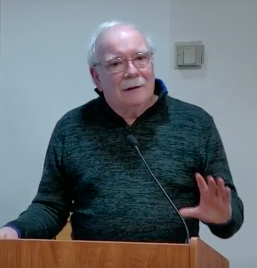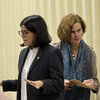Fewer members will be needed for town’s unpopular ethics board
GUILDERLAND — The town has reduced the number of people serving on its ethics board, from seven to five, and extended the time that can be served from six years to nine years.
“In recent years, and particularly in the COVID era, we had problems,” Robert Murphy told the town board of meeting the legal requirements for a quorum.
Murphy, who chairs the ethics board, had written to Supervisor Peter Barber prior to the town board’s Feb. 6 meeting that one of the seven appointed members had died and another had moved out of town.
Other board members, Murphy wrote, had been “unavailable to attend scheduled meetings due to illness, work commitments, and/or other personal or family obligations.”
The appointed posts are unpaid.
The local law, which passed unanimously on Feb. 6, also allows the town attorney to serve as a member to establish a quorum.
“So with these changes, if you have two members that show up to the meeting, James [Melita, the town attorney] will be the third person?” asked Councilman Gustavo Santos.
“Yes,” responded Murphy. “James could be designated as a member for the purposes of that meeting.”
Three members would establish the needed quorum for a five-member board. The state requires the town to have an ethics board of at least three members. “Going from seven down to three would be a bit of a stretch,” said Murphy.
Two functions
Murphy explained that the ethics board has two primary functions.
“The first,” he said, “is to review ethics filings by town employees and officials that are required to file them.” Ethics board members do not do any investigation of the annual forms, he said; rather, they make sure the forms are complete.
Sometimes, Murphy said, his board has to rule on portions of filings being exempt from public disclosure “for good cause.”
He also said, “We’ve missed some of the time-constraint deadlines in the past because we couldn’t get a quorum for a meeting.”
The ethics board’s other function is to respond to complaints in accordance with the town code.
“We have an adjudicatory or a fact-finding function and can enforce the provisions of the ethics code,” said Murphy. If there has been a violation, he said, fines can be imposed.
“It’s the kind of board that’s not likely to win you a lot of friends ….,” said Murphy. “You’re not going to win any popularity contests over disciplinary hearings.”
Serving on the ethics board, Murphy said, “hasn’t been a big draw for people that are looking to engage in public service, but it’s very necessary.”
Changes
Murphy said he had gotten together with Barber and Mark Metro, secretary of the ethics board, “and thought that it might be better to have a smaller board with a longer term that would be able to function in most cases without undue delay.”
The original law allowed a member to serve a maximum of two three-year terms consecutively while the new law will allow three three-year terms.
Both the original law and the new law, which will take effect once it is filed with the secretary of state, ensure that one political party doesn’t dominate the board.
The new law states that no more than two of the five members may be enrolled in the same political party with the exception of the town attorney who serves to establish a quorum if needed.
Both the old and the new law also state that ethics board members must live in town but cannot work for the town and cannot hold office concurrently in a political party or hold elective office in any local, state, or federal government.
Deputy Supervisor Christine Napierski asked, with two Democrats and two Republicans appointed to the board, “Where would that fifth member come from?”
“There’s a lot of voters in this town that are simply not registered in any political party,” Murphy responded.
According to the Albany County Board of Elections, Guilderland has 25,517 enrolled voters: 10,854 are registered as Democrats, 5,685 are registered as Republicans, 597 are Conservatives, 82 are registered in the Working Families Party, and 37 are in the Green Party.
That leaves 8,263 Guilderland voters who are not registered with any political party.
Public hearing
Gerd Beckmann, a Guilderland resident who frequently attends town meetings, asked, “We can’t get seven people to come? …. How often do these things have to take place?”
“We usually do the ethics meetings quarterly,” responded Murphy.
“Is this one of those Star Trek things where you change the rules to match the desired outcome? …” asked Beckmann, who was the only member of the public to speak at the hearing.
“We’ve always had … the political party requirements so that excludes a lot of potential people, maybe Democrats, that may be interested in participating,” said Melita. “So that’s the issue.”
Councilwoman Amanda Beedle noted the posts are unpaid and said, “Right now, we are all Democrats sitting up here, but by saying we are having two Republicans and fair and just discussions for ethics, I believe that is a good thing to have. And if you don’t have everybody here of the same party affiliation, you’re better for it.”
Beedle also said it’s “a notoriously hard board to fill … getting people to step up voluntarily for something that’s controversial … We’re trying to make it so they can continue to have these meetings.”
“We’ve got 37,754 people living in this town together and nobody is caring about ethics — is that what I’m understanding?” asked Beckmann.
Councilman Jacob Crawford responded that some of the best members, who “come to every meeting and are prepared and enjoy doing the work can’t serve after their term limit …. One of the proposals here is to expand, extend that from two consecutive three-year terms to three consecutive three-year terms.”
Before making the motion to pass the the new law, Barber commended Murphy and Metro for their work in advocating for the change.
“It’s unpaid,” said Barber, “and I think it’s a difficult job to have. And I want to publicly thank you for your service of the town.”
As Napierski cast her vote in favor, she said, “I do share Mr. Beckmann’s frustration over the lack of public participation in a lot of aspects in this town. It would be great to see more people get involved and this is a good opportunity to do it — so, you know, spread the word.”



